#I feel like that was something hub would've really wanted to experience no? :>
Explore tagged Tumblr posts
Text
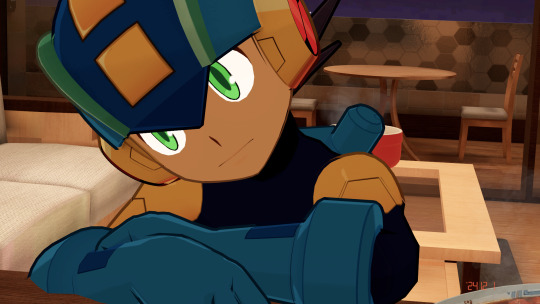
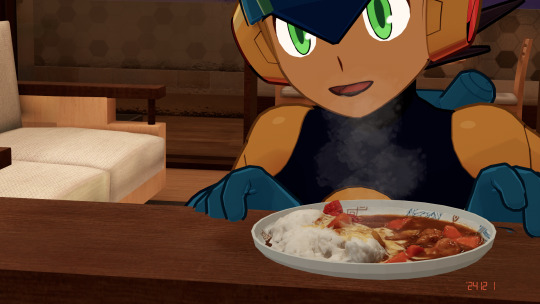

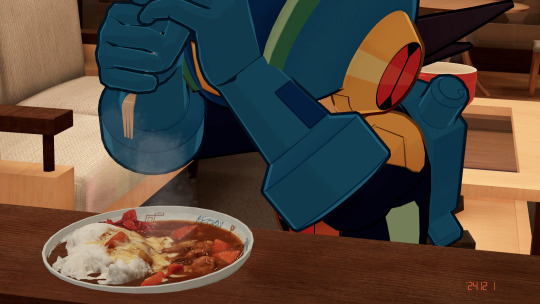

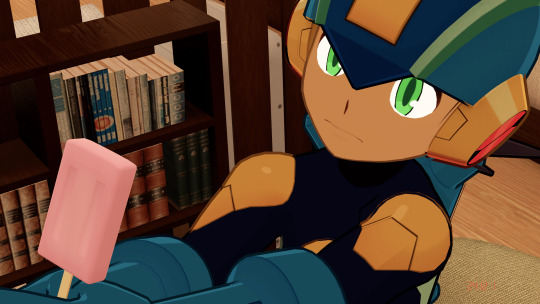

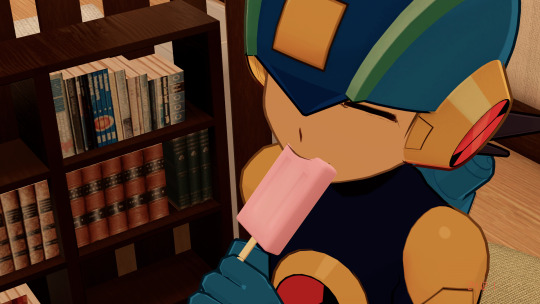

A copious thing of photos as I'm trying to feed my boy in VR today.
#it was So Hard to get these shots because I had to pull my controls away from the food I kept grabbing#then after that I had to scramble back to the pose/angle I wanted while being unable to see my camera#like okay is there any function to snap a shot without pressing the button manually? I'm so confused ( ; v; )#in any case these were the best shots I got#I think it's really neat that over time they let navis “eat/drink” things in bn6#I feel like that was something hub would've really wanted to experience no? :>#vrchat#megaman exe#megaman.exe#rockman exe#(I love this avatar too much he works so perfectly)
50 notes
·
View notes
Text
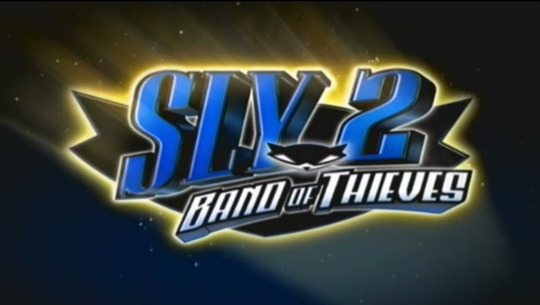
🎵 Poppin' bottles in the ice, like a blizzard. 🎵
This thing-
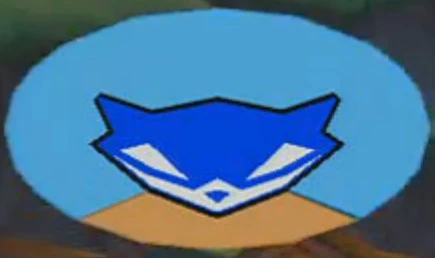
This thing changes everything, it gives me nightmares. This is the first Sly game flipped on its head. So rather than a one-hit KO (unless you gained a horseshoe) you now have a health bar, a lot of enemies had a one hit ratio in the last game but this one, they're less like Crash villains and actually fight back. This sets off your health bar as "alerted" or spotted which is later a feature in Assassin's Creed, there are even trailing and chasing missions.
There are no longer lives because of this meter and makes it so the levels aren't built the same way to where you need checkpoints. This can be both a good thing and a bad thing because I feel like the jumps are more responsive (that could also just be me with more experience now) but sometimes the controls are too responsive so if there's a wire underneath another or something then sometimes it picks the one that you're not aiming for which has blown my cover before. It would've been a lot simpler to just auto-death from that than to have to try to reset it myself by taking damage.
The levels are no longer portals, they're set up inside the hub world so that you enter whatever building it's leading you to or even take place in the hub itself. There are waypoints activated from your binocucom, mostly easy to find. I can't tell if this is a good thing or a bad thing though because on one hand it fleshes out the area that you're in but on the other hand, it diminishes the amount of variety that was allowed in the last game so one level may look like an extension to the last. But once again, each level acts towards a grander mission, except rather than just collecting keys (unless it's a mission on its own), you collect intel and sabotage the enemy's plans, it's more in depth and makes for some wacky shenanigans.
Making up for that lost variety, one of the big selling points of this game is that there are now multiple playable characters which means separate levels for each. Bentley excels in tech and long range Murray in destruction and Sly in stealth, so it is indeed like I remember it. Basically, (when playing as Sly) unless Bentley says otherwise, you shouldn't fight or you'll fail the mission. You can get away, in fact, you have a run button now since your walk speed is more sneaky but it's a little bit louder so it's really only for getaways. With each character, I feel a slight disadvantage for traversal but it's not too overbearing. (Only Sly can tightrope walk and such)
Without horseshoes, you now have all these leftover coins and I've mentioned this in other games and this one actually follows through, it lets the coins act as currency to buy useful items, in this case the stuff that you would've unlocked from the bottles in the first game.

Like my little chart? It would've been confusing otherwise but I wrapped my head around it. So, now the levels no longer hold the bottles but the hub worlds do. This makes it a bit harder because like I said with "unless Bentley says so", if you've started something to do with a level, go too far away from the area you've chosen and Bentley might make you abandon it. So only collect at certain times because it's easier when there's less to keep track of. (That's a good euphemism for this game overall tbh, it's a flip flop whether it's better or worse than its predecessor)
The vault is held in one of the levels but since it could be any of them, you do have the chance to go back to that level once you find it if you haven't had the chance to collect them all the first time around. The bottles still give you abilities, exclusive ones that the coins won't net you, so you actually have more abilities than the first game.
I've complained enough about the differences.
One of the games that I want more of is Beyond Good and Evil and I just haven't found anything like it...until I played this game, I mean you even get to take pictures (not like you would on PS4) but it's nice to see it implemented into the gameplay, especially seeing as BGAE came out just a year before this. And as much as I loved the first game, this one actually actively gave me ideas for how good that supposed movie could've been, it's just a shame we lost it (though maybe a blessing as well?)
I enjoy the story of this game more and while there are some things better, there are some things worse and I think my favoritism of the overall picture would be ratioed to Thievius Raccoonus.
2 notes
·
View notes
Text
Shadow Gambit: The Cursed Crew - quick review (spoiler-free)
Phewww… After numerous delays, two long let's play breaks and almost a year, I've finally finished Shadow Gambit!
And what an amazing experience it was! I kinda wish I would've had the mind to enjoy it more at certain times, but as usual for Mimimi Games, the gameplay, story, and characters are all top-notch.
Mimimi really perfected their tried and tested stealth strategy formula with this one, and thanks to the new fantastical setting, they got quite creative with game design and character skills. It does feel quite different if you come from one of their previous games, but in a refreshing way - you now have the freedom to recruit characters and tackle missions in whatever order you want (save for some scripted story events), and the ship serves as a sort of "hub" in between missions.
Actually, the gameplay even plays into the story! I always think it's really awesome if gameplay and story are so deeply interwoven that one enhances the other, and Mimimi not only designed a twist that turns their core gameplay mechanic on it's head, they also managed to send a message with it that I think is really relevant and valuable (especially for me after what I've been through in the past year).
The overall tone is a little different in comparison to other Mimimi titles - though the story does have its serious moments, there's a lot of humor intermingled in between. Nevertheless, the dialogue is very witty and actually gave me a good laugh quite a few times, so it's great if you're looking for a little more lighthearted experience.
The characters are also a lot more comical and quirky, but in a charming way - one big difference is that due to the game's "free player's choice" approach, there aren't that many interpersonal interactions between the characters, save for the few in the crew tales you can do between missions on the ship that tend to be a little more on the humorous side. (In previous Mimimi titles, character development usually happened during dialogues on the missions; however, since there is little scripted story dialogue for the individual crew members, this is largely omitted.)
While the focus was rather evenly split between the smaller cast of characters in past Mimimi titles, the main story of Shadow Gambit is a lot more focused on Afia. This doesn't diminish the narrative in any way as Afia is a great character and absolutely carries the story, but the greater cast of characters does result in less unique dialogue for the crew members overall.
But not to worry: Every crew member gets their own personal mission! This is where the characters really shine, and the missions do so much to flesh out their development and backstories. (In essence, they're comparable to the loyalty missions of Mass Effect 2.)
Also, it would be a disservice not to mention just how gorgeous the environments look. Every last detail, from the scenic tropical beaches, to the waves that look like you can cannonball right into them, to the shady lighting in the shanty towns at nighttime absolutely sells you that Caribbean pirates feel.
Last but not least, you just gotta praise Filippo Beck Peccoz for composing yet another banger soundtrack - IMO, the guy is seriously one of the most underrated composers in the gaming industry, and he always perfectly captures the vibes of whatever he's composing for. (One of the reasons why I picked up Shadow Tactics back in the day is because the title screen theme absolutely floored me; similarly, the title theme of Shadow Gambit also was the first thing that really sold the game to me.)
In terms of audio, I also appreciate that the game has a really high-quality German dub! It's not something you see too often, especially the "high-quality" part - I did spot some typos and text errors in the German version, but considering the overall quality of the game, this is really negligible.
The two DLCs are also absolutely worth it if you intend to buy them, though they are a little more buggy in some places than the base game. (Since Mimimi dissolved right after the DLCs' release, there probably wasn't that much time left for clean-up.) Yuki's Wish specifically is a real treat for Shadow Tactics fans (like me xD), and Zagan's Ritual is also very interesting from a lore perspective (or if you are into "controlled mad scientist" characters xD).
All in all, I would say Shadow Gambit rightfully deserves the label "masterpiece" - it's just a shame that it didn't attract too much attention. I'd say part of this is because of the "unfortunate" circumstance that there were so many great game releases in 2023 (similar to how Lies of P got a bit overshadowed by Baldur's Gate 3 as an RPG), but I still maintain that it's an absolute crime that Shadow Gambit wasn't even nominated for Best Sim/Strategy Game at The Game Awards 2023 - and now that I've played it myself, I want to say that it shouldn't only have been nominated, it should've won.
But ultimately, this is just a sad confirmation of the reasons why Mimimi Games had to close their doors: The effort and expense they put into their games were just out of proportion with the revenues they received from them. Yes, they catered to a very niche genre, and yes, they could've tried producing games for more "popular" genres, but would that really have been for the better? I have seen so. many. games that tried to bite off more than they could chew and ended up being unable to achieve the goals they had set for themselves. Thus, I respected Mimimi Games all the more for their approach of "We do what we can and aim to realize it in the best way possible", while also continuously experimenting and modifying their formula.
Personally, I'd say that with Mimimi Games, not only Germany but the gaming industry as a whole has lost one of their best model studios, a loss that I will probably mourn forever. Nevertheless, I have full respect and understanding for their decision. (Though I still hate how everything has to be mainstream because that's the only way to make money... -_-)
Anyway, this game - as basically everything by Mimimi Games - comes with my highest recommendations. If you like RTS, if you like pirates - or heck, both - I can only advise you to check out Shadow Gambit.
In fact, you can do so right now: Until January 27th 2025, the RTS festival on Steam is still going on, and all demos of Mimimi's stealth strategy titles - including Shadow Tactics, Desperados 3, and Shadow Gambit - are free to play on Steam.
#shadow gambit the cursed crew#shadow gambit#mimimi games#gaming#video games#game review#rts#rts games#real time strategy#steam
1 note
·
View note
Text
very quick opinion on name changes...
tbh....i think it's good to chase a vibe that's truly your own identity and how you'd ever want to define yourself, but there's some that i'd see in a case-by-case basis i'd just consider "pointless." and I mean "pointless" on the sense that i'm able to tell that they're wanting to run away from what they once loved...just straight-up "run" if you're not really being harmed directly so frequently -- unlike at a certain earlier point -- by the time you actually change your name, why do it? if it's already catchy, why change it?
if it's already recognizable, why change it?
If I have a grandeur following, then if I truly vibe with any current name of my own, I'd only change my own name in these case scenarios:
if there's been confusion to begin with (like "'Lectric Shave" used to be called "Whiskers" *VERY* early on but they ended up using "Whiskers" to describe facial hair too heavily in their earliest advertising, hence a quick change...it was a shaving gel)
if you're directly harming your inspiration with your behavior *ALONGSIDE* having loosely taken the name from such a person
There's times that you'd feel shame from fandoms you'd once been a part of...well, alright. If the sentimental value isn't "there" or couldn't ever be as much "there" anymore due to the former toxicity, then it becomes more understandable, but it's otherwise a mixed bag if your forefront perspective is to "search for a new vibe." And it makes following, people-looking-to-follow-you situations slightly more awkward if you only change any name "partially" due to the fact you want to believe there's roots of any fandom you've loved you want to *hope* still has merit. i have fandoms like that too that i've followed a long time...and from my experience, i can safely say that you shouldn't be faulted for being honest about how you didn't like a fandom in the past.
Tumblr was becoming a "hub" that the shame would've been "too key," too, but look what happened to Twitter. There's new value to be found in Tumblr once again, because Musk has violated rule #2 in a worser variant:
he owns and is fucking up something he never should've
0 notes
Note
i used to love scorpion but it's become mediocre since the second half of season 2 bc all they've done is bait waige. tbh, it's not a good ship and maybe i'm biased bc i've headcanoned walter as aromantic (which would've worked much better in terms of his character since the show seems to be telling ppl with higher IQ that to find a place they belong they have to develop EQ to "evolve" when as a society, we should be accepting them and not making them fit in with us)
No offense anon, but… Is there a question in this? It’s unclear exactly what you’d like to discuss or know from me. But I chose to take my time with this response in order to open a discussion within the fandom. This isn’t a rant. Lol!
I disagree with the notion that the show is telling its audience that high IQ, low EQ individuals have to develop EQ to evolve or fit into society. This insinuates that the geniuses sacrifice their intellect in order to become less socially inept. This is simply not the case. One of the show’s core messages is to communicate the benefits of emotional intelligence in relation to one’s goals to share that intellect with the masses - learning to adapt without sacrificing identity. The message is continuously addressed with Walter O’Brien because he is the genius with the lowest EQ, the creator of Scorpion, and uses his business as a hub for like-minded individuals with various skill sets.
What makes us different from animals as humans is cognition - the ability to reflect on our thoughts and experiences and act on them to change ourselves and our environments. Walter is not efficient at processing emotion to label it properly, meaning that he can not identify behaviors to which he can not relate. This does not mean he can not emote, but the amount of EQ he gains over time is learned. It does not derive from within. The same is true of the other geniuses to a lesser extent. (Elyes Gabel talked about this at the cast’s first SDCC appearance - Walter has an emotional vault that he struggles to access.) Furthermore, Walter’s environment contributes to how well he can regulate his emotions. In the show, Walter’s intelligence was fostered as a child through his work for the government. But his emotional development was only fostered through Megan because she accepted him for his differences unlike his parents. This is why he was so protective of her medical care and fought hard on an intellectual level to save her. Since Walter’s emotional development is an arc for the entire series, his character will be written to show his successes and failures in various aspects of his life in relation to his life goals.
As far as attraction is concerned, Walter could be written as aromantic in relation to his genius. This would have been a great and intriguing development. But various moments in the show suggest that Walter, at the least, is romantically attracted to women for now. Therefore, his emotional intelligence will also have an impact on any romantic relationship he seeks to have given the show’s premise. If you’ll indulge me, allow me to explain using recent scenarios from the show, present the conundrum that lies within fandom, and how that conundrum is capitalized in order to “bait” fans on Waige under the cut. It’s long, so don’t say I didn’t warn ya! 😜
Examples from Canon
In episode 2.22 Hard Knox, the team mobilized to help Ralph win his court battle. Ralph tried to explain his program’s functions to Walter, but he couldn’t understand Ralph’s approach. Sadly, Walter projected his frustration over a problem he couldn’t solve in that moment onto Ralph. This led to Ralph walking away feeling defeated and Paige threatening to quit. When he realized the mistake in his behavior, he approached Ralph and said this, “what upset me is that you were willing to slow down for me to-to let me go down the wrong road, when that would’ve hindered you, because I couldn’t grasp your work. Never hobble your intelligence for anyone… because if you do that in this garage, imagine what you’ll have to do out there… for humans. The world needs to catch up to you… because if-if it can, just a little, imagine what a… a beautiful place it could be.” This example is unique because it reinforces the show’s core message in IQ vs. EQ on the basis of intelligence, not emotion.
In 3.15 Sharknerdo, Walter argued with the client over the way he stated the service fee instead of accepting the fact that the client was not interested in learning the correct way to communicate $109,000. This cost the team their job and dismantled the weeks of work Paige did to secure that contract. Paige was rightfully frustrated because Walter couldn’t get like Elsa and let it go. 😂 Plus, it’s even more frustrating that Walter secured a new job on contingency, where payment is only guaranteed upon completion of services. This is bad for Walter despite the fact that Paige is the liaison for several reasons: 1) he talked with the client in her absence, 2) he lost a job with a secured fee and replaced it with a less secure one (that’s not good business when you have employees to pay), and 3) he is the boss of Scorpion who makes the final decisions. In Paige’s absence, he is the next point of contact for independent jobs (those not issued through Homeland Security). This is the statute of limitations when it comes to his goals for Scorpion. He has to acquire skill sets to make him more efficient at communicating with average/high EQ, non-geniuses if he wants to diversify his clientele to do more good in the world. In other words, he has to learn and apply approaches on an EQ level to appeal to normals in order to get them to his level or create an equal playing field. Another great example of this can be found in his interaction with the foreman in 3.14 The Hole Truth after his talk with Happy. I apply the same tactic as a researcher. I have to know my audience and how to address them in order to communicate my findings and spark interest. If I do not, I limit my reach and open doors to miscommunication and misunderstanding.
Also take into consideration instances where Walter has lied about facts in order to achieve the greater good. Episode 2.04 Robots is a great example. What’s also interesting about this episode and others in which this has happened is that Walter doubts the scope of his own emotional intelligence. The same is seen with Happy Quinn whose EQ is closer to Walter’s. If you have read any of my reviews, I talk about this doubt factor several times. Walter and Happy have demonstrated emotional mastery in both their work and personal lives. Their main issue is consistency outside the limitations their logical brains impose on their emotional functionality. Yet overall, they improve each season.
This show is loosely-based on the real Walter O’ Brien, who is an executive producer. If you ask him to choose between IQ and EQ, he will tell you, EQ over IQ, from his own personal experiences which has been infused widely throughout this show. You can read that interview HERE and learn what he did to create the show. It’s very enlightening!
Fandom Realities
Here’s the conundrum that stems from fandom. (If you read the interview, then you already got a sense of what I am about to say.) Scorpion is an action dramedy in two parts - personal stuff and mission stuff. And these two elements are interchanged in every episode. However, the majority of fan commentary on the show is about the romances first, the other personal storylines second, and the missions last. This means the greatest pull, as far as spoilers and other marketing strategies are concerned, is information on the ships whether it’s through social media, press releases, or cast interviews. The majority of fans don’t get excited over the missions (or else that would be reflected in fandom convo and creations). Scorpion covers some real projects like the Chernobyl dome and the Svalbard Doomsday Vault (both of which are really cool btw). And I am curious if an upcoming episode will take a note from a docu-drama on Mars that debuted on National Geographic. Anyways, Waige is not canon and yet Waige-centric episodes receive behind-the-scenes exclusives on pop culture news sites like Entertainment Online. Katherine McPhee and Elyes Gabel are sent out on press to talk about them. You do not see similar treatment with the other ships because Waige is the main ship of the show. All others are side ships, regardless how much exposure they get. Quintis is highlighted in the storyline because the relationship is between two main characters, who are both high IQ, low EQ individuals, as opposed to Callie (RIP 💀) which is between a main and a guest, both of whom have average/high EQ.
The showrunners, writers, cast have alluded and established in many ways that Waige is an endgame, slow burn otp. The mystery lies in WHEN this will happen. It would be stupid for them to reveal that information. But they use episodes to answer that question for the fans. As fans, we can choose to trust what is there to put our expectations in check or fall for the bait! Besides, we get more receipts the more the writers use more than one episode to foreshadow. If we don’t like what we see after some time, we have to determine what is the breaking point and move on or devise a new plan to indulge the content (e.g., skip episodes, binge later). We also have to take into consideration that some decisions are in the hands of network execs. At the end of the day, it makes no sense to engage in endless emotional masochism over something we no longer enjoy. It’s silly! But I digress. If you want to know more about my theories on Waige, feel free to go to my page, type “the Waige flip” in the search engine, and read all about it. As someone who ships Waige, I don’t have any questions on them until season 4, episode 12/13.
I will not argue whether Waige is a good ship or not because it’s not my place to police opinion. What I will say is that Waige is an intriguing pairing because it is a relationship between a low EQ individual and a high EQ individual - a genius and a normal. (Btw, high IQ, high EQ individuals exist - it’s a function of nature vs. nurture. But that’s a topic for a different day!). Melvester had the same dynamic, but the EQ gap between Megan and Sly was much less than that between Walter and Paige. For this reason, Waige will always face unique challenges. Like I said at the beginning of all this, Walter’s emotional development is a series arc and his triumphs and failures will extend to his personal life. But one thing this show does well is communicate understanding in the team’s decisions, both geniuses and non-geniuses, whether you agree with their stances or not. That’s necessary given the show’s premises!
If you’ve read up to this point, CONGRATS!!! You have survived another Emanda’s Inner Sanctum analysis/thought piece! Toodles peeps! 😘✌🏾️
21 notes
·
View notes
Text
"What would've happened if Hitchcock made a movie in an Uber?" - Meet filmmaker Jeremy Ungar of Ride.
I caught up with filmmaker Jeremy Ungar for a chat on film, the rapid advance of technologies like Uber, influences, Michael Mann, filmmaking ISO and painting with light, lenses, and a realist visual palette (á la Edward Hopper) as it relates to his newest picture, Ride – out now on VOD.
A struggling actor by day, James (Jessie T. Usher, Independence Day: Resurgence) pays his bills by driving people around Los Angeles for a ride sharing service. His night starts out like any other, but he can’t believe his luck when he picks up the beautiful Jessica (Bella Thorne, Assassination Nation), and they immediately hit it off. His next fare, the fast-talking Bruno (Will Brill, The OA), convinces James to go back and invite her to join them for a wild night out. But things take a shocking turn when Bruno, armed with a gun and a twisted idea of fun, forces them on a terrifying, white-knuckle ride that quickly spirals out of control.
Ride really would be the result of Mann’s Collateral getting a technological makeover and mentoring advice from Alfred Hitchcock. I highly recommend checking it out on VOD today and I hope you will learn as much as I did from this conversation with a gifted young creative.
Hi Jeremy. Welcome to The 405! How are you?
I'm good how about you?
Oh not too bad. Getting right into it what was it that initially inspired you to write Ride?
Well, I'm really fascinated by these new – kind of newer – interactions that technology has created for us. That, you know, before Uber existed, before Tinder existed, if you said to someone "alright, there's this app and you're going to get into a stranger's car and then they'll drive you somewhere and you don't know them and you've not met them". You'd be like "um, there's no way I'm doing that ever."
Yep.
And the way that these quickly become such a part of our lives that it's so commonplace people do it every day. And that was, I was really just doing that and I also really wanted to write something for myself because my background is in theater… so dialogue wasn't really concerned. I had these kind of charged experiences, most of them have been positives, in most case. I just started this, it's become this native unique space that's kind of right for drama. Then I started writing, you know, some possibilities of what should happen in the new world and I came to this kind of very strong, very manipulative, character and I was really drawn to dialogue that came out, I kind of surprised myself writing it. Then that was really made me dive into this as a project.
Cool. Yeah Bruno [Will Brill] was manipulative to put it lightly. Kind of going off of that, one thing that seemed to me to be very important for the movie, was pace.
Jessie T. Usher as James in the thriller “RIDE,” an RLJE Films release. Photo courtesy of Rob C. Givens.
I have to say I wasn't really seeing that 180 degree turn that happened about the time they get to the bar. You know, I was watching it wondering, what's this guy going to do, what's his end game, it just keeps wandering for most of it; but I was just wondering what were some of the tricks to sort of balancing the tension throughout the movie?
The pace of the movie is something that is really kind of interesting thing to me because, like I said, my background's in theater and you get a lot of long takes with this. When we shot on the process trailer – which is how we did most of the car stuff – you're strapped to a flatbed truck and you know you have your cameras mounted and you're driving. It really truly did seem like it was theater and we would do, you know, a sure five, ten minute take with two cameras.
Fascinating connection.
So that kind of locked into the pace, you get, just in directing in the scene as you shoot it and any chance you have to adjust that pace is by cutting to a different take. Which you also are locked into a really specific set of constraints because the car is moving, so you have to kind of match the speed when you cut. So it's a really kind unique set of challenges, but I like restrictions like that so it kind of gave me a lot of style and made this sort of a puzzle to put together.
A process trailer. Source:MovingPics.net
Necessity is the mother of invention.
And also we wanted to show that there was something mysterious, immediate and serious right there in the car with them and there is a sense that they are really doing this, because in a sense they are.
Oh, absolutely, I think that was communicated really well. And another thing I really liked about the movie was the realism in terms of the cinematography and the visuals. Kind of in the vein of Nightcrawler in that sort of neon grit.
Oh thank you, that was a huge point of reference for me.
Oh good. Yeah. I was just wondering, what was the process like in coming up with the visuals that you ultimately did?
I have directed this drama as a short to prove that I can do it as a feature.
Oh cool. I respect that proof of concept type of thinking.
In the short, we shot on a barge which was a really good experience. When I started talking with the DP who did the feature – a guy named Rob Givens – who proposed using the pass on a fairy cam. The thing that makes the camera unique is it has a flip flop hub in terms of the ISO. So it kind of belabors 800 which is standard. We did our movie at 5,000. We really tried to shoot the entire movie at 5,000 ISO.
Yeah. That's gonna dramatically increase the light that's captured.
Yeah. It resulted in us getting a lot more light in, but from a process perspective, we didn't have to use as many lights and we were able to be a lot more nimble, also in terms of just loving the lights of Los Angeles. I really wanted the movie to kind of feel like a full character in itself, and with that 5,000 ISO I feel you were able to see so much of the outside res that it really became a key part of our aesthetic.
Absolutely.
So that was one element of that and it also made the choices of cinematography easier. Rather than getting a third package of primes, prime lenses…
Yeah.
…we had our fairy lenses and they are Panavision C Series lenses, you know, they are hard to track down and expensive and so we opted for fewer lenses. In that restriction, in the moment, having those lenses that would give us a lot of the kind of horizontal flares and oblong bokehs and things that made, at least I hope. You remember in one space how visually varied the scenes were? It's the lenses and flares that tend to get that.
Will Brill as Bruno in the thriller “RIDE,” an RLJE Films release. Photo courtesy of Rob C. Givens.
Oh, absolutely. Switching gears to a question I like to ask everybody, what directors and films have been most influential on your development as an artist.
My favorite question.
Cool. A big one too.
For Ride specifically, I really I think maybe a core question is what would have happened if Hitchcock made a movie in an Uber? You know, Strangers on a Train was really a key point of reference for me and balancing the fact that the character named Bruno is a reference to Strangers on a Train.
Interesting. Yeah, Robert Walker's character. Makes sense now that you say it.
It just cycles round. It comes from Hitchcock being the first director as a kid that I watched that I found the movie so accessible and just loved it so much that that is probably really only the most secondary thing that made me become a film maker.
Yeah, Hitch is great. Vertigo would be a favorite of mine from him.
Then the other really big point of reference for Ride is this early Spielberg movie called Duel. Which is also all set in a car. And it's a super tense film. It's different because Duel is almost nonverbal and Ride is like a real dialogue. But I just feel that there is so much to learn from it in terms of how he dealt with the car and then also just building tension in a confined space. Spielberg was really a master of in that era movie. And that I hoped to really learn something from them.
Absolutely. You know another one that came to my mind when I was watching it was Michael Mann's Collateral…
Yes. Tom Cruise.
I loved Collateral. It was kind of unbelievable because it's so similar to Ride but I really didn't think about Collateral at all when I was writing Ride.
Oh really?
I didn't think a ton about Michael Mann. Yeah but I was like I mean I must have subconsciously been, but really it's interesting, I made a whole visual reference back to kind of outline the vision of what the future would look like and there are a ton of images from Thief.
Good one as well.
And so I was thinking intentionally about Michael Mann and probably Collateral was marinating in there but not one that I was at least telling myself to directly thinking of it. It just so happened that it... that you could definitely pitch Ride as Collateral and an Uber.
Yeah. You really could.
The other Michael Mann thing is I loved the movie Thief so much and the soundtrack of Thief was done by Tangerine Dream. And the soundtrack to my movie was actually done by Paul Haslinger who was a key member of Tangerine Dream.
Cool. Didn't realize that.
So I had something that really evoked that movie that was so inspirational to me and I loved so much.
Awesome, definitely. Our last question, what's next for you Jeremy?
There's another script that I am writing right now. That's also about our relationship with technology. It kind of gives more ... the amount of trust we put in technology and with devices and I think I really think our cell phones are really killing us but they are just so fun that we can't tell.
The next script is kind of very loosely about that same thing.
youtube
from The 405 http://bit.ly/2NbZOfh
0 notes